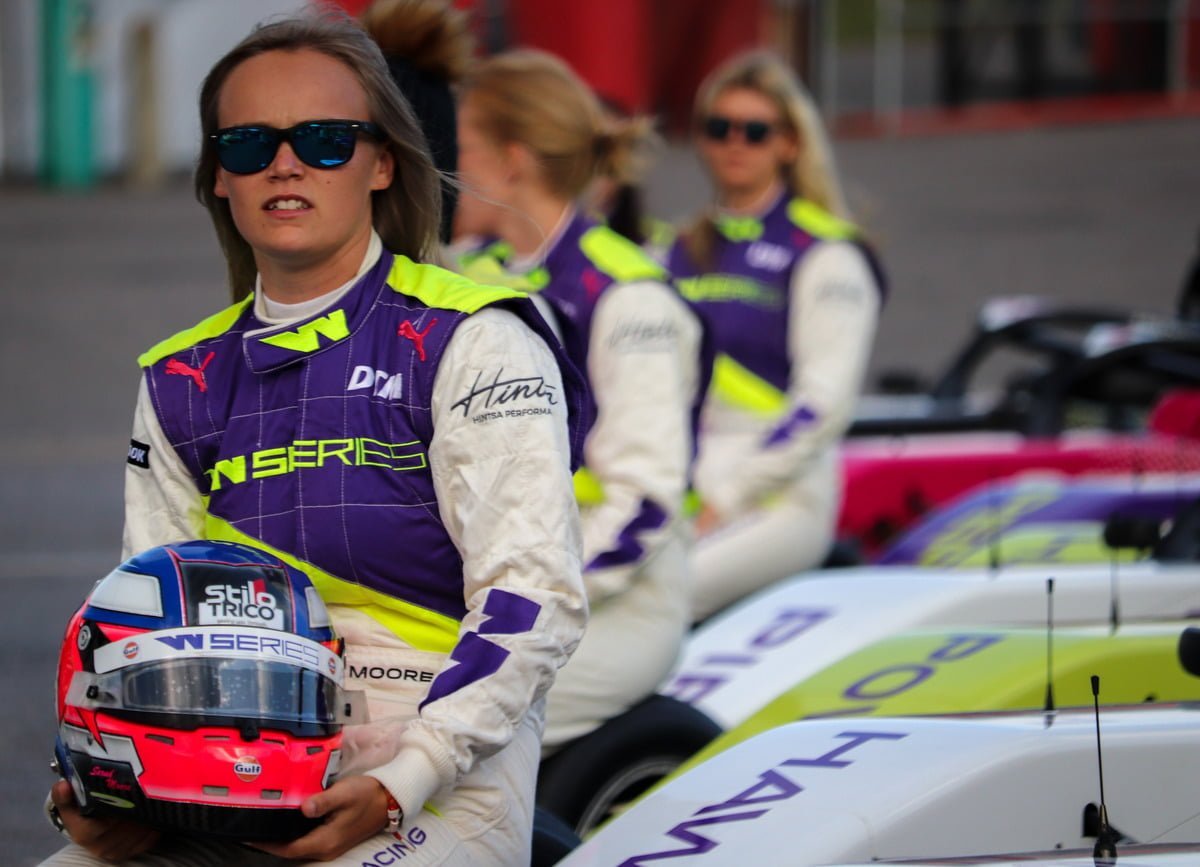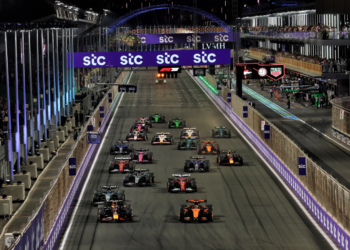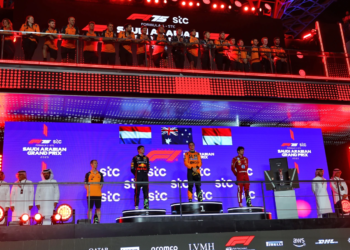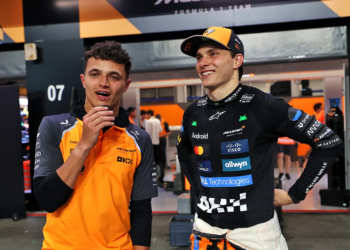Former W Series driver Sarah Moore shared with Motorsport Week her ambitions as a driver coach, mentor, and engineer in women’s motorsport.
Moore enjoyed a successful career in karting and single-seaters, competing in W Series, Porsche Sprint Challenge and LMP3 Cup.
After the dissolution of the all-female racing series W Series, Moore found herself leaning towards a coaching role.
Moore said: “One of my goals is to try and help and support more females within the sport because there’s something I never had growing up.
“I’m at a point now where I would love to continue racing, but I also want to give back to the future generation – so my focus has shifted to helping others as opposed to focusing on myself.
“This year I’ve switched to an engineering role so I’m engineering two drivers for Elite Motorsport in the GB4 Championship.
“I’m happy one of those is a female racer who won the first race in the first round of the championship.”
Having raced for over 20 years, Moore has dealt with every challenge thrown at her and is now ready to aid the next generation.
She explained: “One of my jobs this year is to be one of the coaches for More Than Equal who aim to help support females in motorsport.
“I’ll be mainly focusing on the driving aspect, but also offering support in terms of training, nutrition, and psychology to help female drivers prepare for higher levels of motorsport.
“I’ve been coaching for about 10 years now, so it’s nice to be at circuits and help drivers that want to find their career path.”

Although Moore had a chance to compete in W Series, the experience in the free-to-enter single-seater series was short-lived.
W Series only ran for three seasons and struggled to recover after the Covid-19 pandemic hit, falling into administration earlier this year.
Female drivers in the series such as Jamie Chadwick, who snagged all three championships, have moved on to other series.
Marta Garcia landed a spot in F1 Academy and FRECA, while Chadwick now races in INDY NXT.
“Having been in the W series myself and looking back on it now, I think a better option would be for Formula One teams and sponsors to invest in females to support them in mainstream motorsport pathways,” Moore said.
“As much as I think it’s great that W series giving female drivers a platform, at some point the female drivers then have to go back into the ‘real world’ effectively and go back racing against the men.”
The fall of W Series indirectly paved the way for F1 Academy, as a handful of teams and drivers migrated to the new series.
Backed by Formula 1 and the FIA directly, F1 Academy places its female drivers on an even bigger platform than W Series.
Moore said: “F1 Academy wouldn’t exist if it wasn’t for W Series. W series was part of the f1 package, but in reality, we didn’t have quite as much support from F1.
“F1 Academy is great because it’s run by F1. It’s on the F1 calendar which is absolutely amazing because the girls get to race on circuits that they may not get to drive otherwise.
“I just hope that when they move on from F1 Academy, they can step into another formula series and continue their progression.”
For many female racers, progression into different motorsport pathways is the biggest factor in halting their careers.
Building a career as a female racing driver in a male-dominated sport was no easy feat and Moore has always been vocal about barriers in the sport.
She explained: “I think one of the biggest issues is that people aren’t investing in the development of female drivers within the sport.
“There’s been a lot of male drivers that go through Formula 2 into Formula 1, they climb through the ranks with the help of their trainers, nutritionists, psychologists, etc.
“When it comes to female drivers, it has to be slightly different because our way of training has to be slightly different to male needs.
“It’s not that we’re not strong enough, it’s just that we need to be trained in a slightly different way to the males to achieve the results. Look at female RAF pilots and the G forces they can withstand.”

Now that she’s made the shift to help young female drivers in the sport, Moore realised how big the gap truly is in grassroots motorsports.
Despite the rise in interest in motorsport, female drivers receive far less funding than male drivers as they enter the sport much later.
“I think there’s a lot more research time and money that needs to be put into the development of female drivers to bring them into single-seaters at a younger age,” Moore continued.
“Female drivers are coming in at a later age than males who have been training from 13/14 years old.
“They find themselves on the back foot before they’ve even started racing in junior championships, fighting all year to try and catch up a gap that is almost impossible as the male drivers have already spent a full year preparing.”
Moore wholeheartedly believes that support needs to start from the ground up, as progression through motorsport starts very young.
She continued: “What’s missing is the numbers of girls at grassroots motorsport. Once we’ve got them in, we need to help them progress from a grassroots level to a high level.
“The reality is, not many of them know how to get there or what they need to do to get there, and I think that’s where the knowledge needs to come in.
“You need driver coaches, nutritionists, trainers, etc to prepare young drivers in the best way possible and guide them in the right direction.
While the fight for women in motorsport continues, the support from drivers such as Sarah Moore proves to be as necessary as ever.
As women in motorsport begin to show their talent at the highest levels alongside male drivers, more young girls will turn to karting.
Chadwick recently picked up her first INDY NXT win while the Iron Dames continue to earn podiums and wins at the highest levels of endurance racing.
The future is bright for women in motorsport, and only time will prove it.









